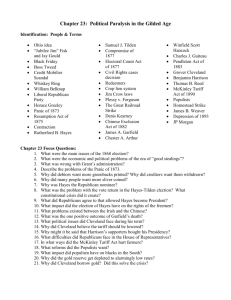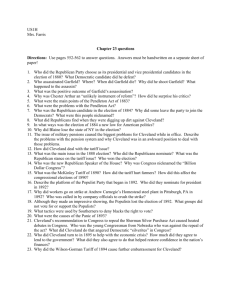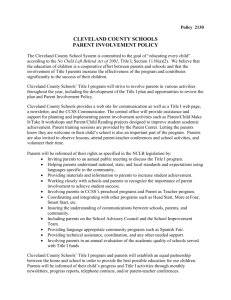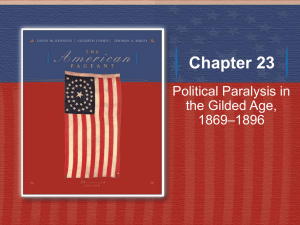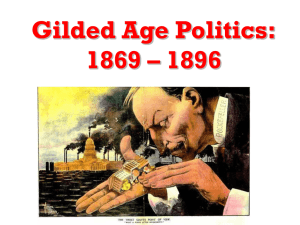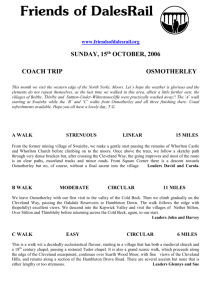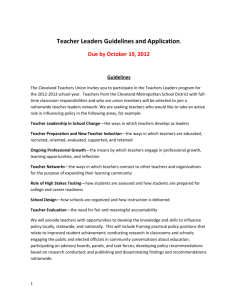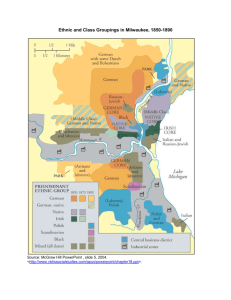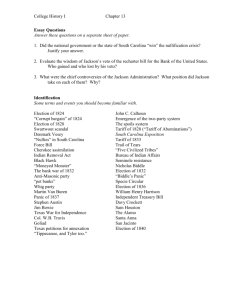AP United States History Mr. M. Pecot Bailey, Chapter 23: Politics in
advertisement
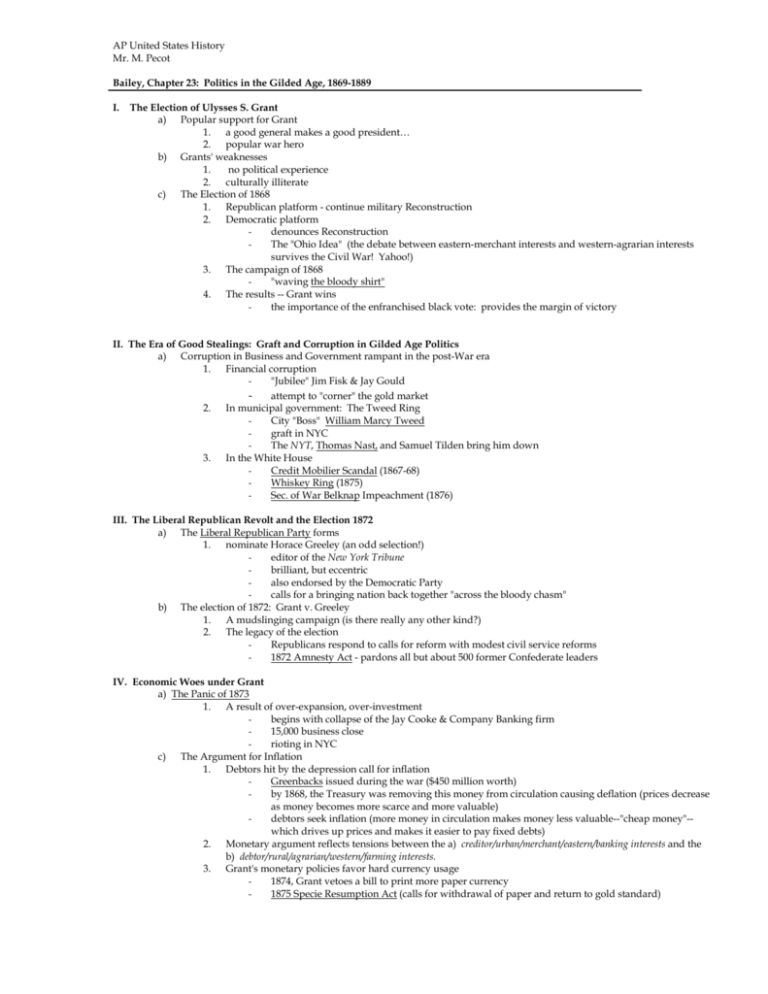
AP United States History Mr. M. Pecot Bailey, Chapter 23: Politics in the Gilded Age, 1869-1889 I. The Election of Ulysses S. Grant a) Popular support for Grant 1. a good general makes a good president… 2. popular war hero b) Grants' weaknesses 1. no political experience 2. culturally illiterate c) The Election of 1868 1. Republican platform - continue military Reconstruction 2. Democratic platform denounces Reconstruction The "Ohio Idea" (the debate between eastern-merchant interests and western-agrarian interests survives the Civil War! Yahoo!) 3. The campaign of 1868 "waving the bloody shirt" 4. The results -- Grant wins the importance of the enfranchised black vote: provides the margin of victory II. The Era of Good Stealings: Graft and Corruption in Gilded Age Politics a) Corruption in Business and Government rampant in the post-War era 1. Financial corruption "Jubilee" Jim Fisk & Jay Gould - attempt to "corner" the gold market 2. In municipal government: The Tweed Ring City "Boss" William Marcy Tweed graft in NYC The NYT, Thomas Nast, and Samuel Tilden bring him down 3. In the White House Credit Mobilier Scandal (1867-68) Whiskey Ring (1875) Sec. of War Belknap Impeachment (1876) III. The Liberal Republican Revolt and the Election 1872 a) The Liberal Republican Party forms 1. nominate Horace Greeley (an odd selection!) editor of the New York Tribune brilliant, but eccentric also endorsed by the Democratic Party calls for a bringing nation back together "across the bloody chasm" b) The election of 1872: Grant v. Greeley 1. A mudslinging campaign (is there really any other kind?) 2. The legacy of the election Republicans respond to calls for reform with modest civil service reforms 1872 Amnesty Act - pardons all but about 500 former Confederate leaders IV. Economic Woes under Grant a) The Panic of 1873 1. A result of over-expansion, over-investment begins with collapse of the Jay Cooke & Company Banking firm 15,000 business close rioting in NYC c) The Argument for Inflation 1. Debtors hit by the depression call for inflation Greenbacks issued during the war ($450 million worth) by 1868, the Treasury was removing this money from circulation causing deflation (prices decrease as money becomes more scarce and more valuable) debtors seek inflation (more money in circulation makes money less valuable--"cheap money"-which drives up prices and makes it easier to pay fixed debts) 2. Monetary argument reflects tensions between the a) creditor/urban/merchant/eastern/banking interests and the b) debtor/rural/agrarian/western/farming interests. 3. Grant's monetary policies favor hard currency usage 1874, Grant vetoes a bill to print more paper currency 1875 Specie Resumption Act (calls for withdrawal of paper and return to gold standard) 4. 5. Silver - The US Treasury stopped minting silver dollars in 1873. inflation advocates call for a return of the minting of silver dollars at a ratio of 16 oz. of silver to 1 oz. of gold in order to drive up the money supply. Bland-Allison Act of 1878 - doesn't go far enough to cause inflation Importance of the monetary debate hard-money policies of the Grant administration result in "contraction" from 1870-1880 hard-money policies probably worsened the Depression gave the Democratic Party an issue to run on in 1874 -- retake the House of Representatives formation of the Greenback Labor Party in 1878 - 1 million votes, 14 MOC's V. Gilded Age Politics (and you thought monetary policy was boring!) a) Political See-Saw 1. Close elections, frequent turnovers in House makeup majority party switched six times in 11 session between 1869-1891 divided government (H, S, and White House) discourages bold stands by politicians 2. Political Parties little difference between the Dems and the Reps on major issues: tariffs, currency, civil service reform… ferocious competition motivate their constituents at election time (voter turnout 80% from 1860s-90s) b) Characteristics of the Parties 1. cultural & ideological differences Republicans = Puritan religious roots, native born, support gov't involvement in economy and society Democrats = numbers include Roman Catholics and Lutherans, less stern, opposed gov't attempts to impose a single moral standard on society. 2. geographical centers of party loyalty Democrats: South (but not among freedmen), Northern industrial cities (immigrants and political machines) Republicans: Midwest, Northeast, and freedmen, and the GAR 3. use of patronage and spoils use of spoils to gain support common Sen. Roscoe Conkling (R-NY) and the "Stalwarts" v. Rep. James G. Blaine (R-ME) and the Half-Breeds stalemate the GOP over the issue of civil service reform VI. The Disputed Election of 1876 a) Rutherford B. Hayes: "The Great Unknown" 1. political qualifications veteran officer of the Civil War an Ohioan--the "swing state" b) Samuel J. Tilden: "Whispering Sammy" 1. runs on a platform of reform c) The "disputed" election 1. Tilden wins the popular vote, but only has 184 electoral votes (he needs 185) because the returns in 3 states are being disputed 2. The electoral returns in three southern states are disputed due to allegations of fraud and intimidation of black Republican voters: SC, LA, and--surprise, surprise--FL 3. Each state sends in two sets of returns--one for Tilden and one for Hayes. 4. The constitutional crisis: who counts the votes? The Republican president of the Senate, or the Democratic speaker of the House? Will there be a President by inauguration day in March? d) The Compromise of 1877 1. Electoral Count Act of 1877 establishes an electoral commission of 15 men to count disputed returns--the commission is 8-7 Republicans to Dems. During roll call of electoral votes, the Florida return is challenged and sent to the commission, which by an 8-7 vote accepted the Republican returns Enraged Democrats threaten to filibuster the remaining proceedings… 2. Reconstruction falls victim to politics GOP agrees to withdraw troops from SC and LA and to support a bill giving federal aid to the construction of the Texas and Pacific RR's construction of a southern transcontinental line in return for a Hayes presidency. VII. The Collapse of Reconstruction a) Support for Reconstruction had been waning in the GOP 1. Civil Rights Act of 1875 - an attempt at equal accommodations proved futile b) 2. Civil Rights Cases (1883) - guts the Civil Rights Act The condition of freedmen after 1876: second-class citizenship 1. sharecropping and tenant farming 2. segregated educational facilities 3. systematic disenfranchisement through fraud and intimidation 4. Plessy v. Ferguson (1896) upholds the doctrine of "separate but equal" VIII. The Presidency of Rutherford B. Hayes a) Turbulent years in office 1. The Election of 1876 hangs over his head Rutherfraud, Old 8-7, His Fraudulency - allegations deeply offend his sense of honor 2. Labor disturbances Railroad strikes across the nation in 1877 - troops suppress strikers 3. Anti-Chinese uproar on the West Coast 75,000 Chinese laborers in California by 1880 Dennis Kearney in San Fransisco 1879 Chinese Exclusion Act -- vetoed by Hayes (finally passed in 1882) b) Hayes' legacy left little to be desired IX. The Garfield Presidency a) 1880 Nomination 1. Hayes not in running, pledged to one-term 2. Stalwart v. Half-Breed factions compromise to select candidates: James A. Garfield for Pres, and Chester A. Arthur (a stalwart) for VP b) 1880 campaign 1. Republican platform: protective tariff and some civil service reform 2. Democratic platform: Winfield S. Hancock is candidate, runs against tariff and for civil service reform 3. both parties avoid big issues 4. close election--fewer than 40,000 votes elect Garfield c) The assassination of James Garfield 1. occurs during the beginning of a political showdown between the Half-Breeds and the Stalwarts in the White House 2. Charles J. Guiteau -- a deranged office seeker shoots Garfield in a Washington railroad station in 1881. X. Chester A. Arthur in the White House a) Arthur and Civil Service Reform 1. Arthur seemed entirely unqualified; owed his career to the Conkling political machine in NY in reality, he was highly intelligent his job as collector for the Port of New York put him in charge of the largest federal office in the nation: 2/3 of all tariff revenues were collected there 2. Arthur surprises the Stalwarts by taking on Civil Service reform prosecutes post office frauds "For the vice-presidency, I was indebted to Mr. Conkling, but for the presidency of the United States I am indebted to the Almighty." public pressure encourages Republican action 3. The Pendleton Civil Service Act of 1883 Magna Carta of civil service reform establishes a merit system for classified federal jobs created the Civil Service Commission to administer tests prohibited "assessments" of how much a federal employee contributed to a political party b) The legacy of reform 1. Changes political parties politicians court contributions from business leaders and lobbyists XI. The Election of 1884 a) The Candidates 1. Republican: James G. Blaine tattooed with political villainies, e.g., the Mulligan Letters Mugwumps bolt the party and join the Democrats 2. Democrats: Grover Cleveland a reformer from NY rising star in NY politics "Grover the Good" label tainted by illegitimate son b) The Election of 1884 1. little attention to the issues campaigning revolved around personalities, not issues "Burn, Burn, Burn this letter" v. "Ma! Ma! Where's my Pa?" 2. A margin of less than 30,000 elects Cleveland mugwumps shifted the tide Blaine's campaign failed to condemn a Republican clergyman's anti-Irish speech in NY: "Rum, Romanism, and Rebellion" -- costs the GOP Irish votes in NY XII. The Cleveland Presidency a) Cleveland in office 1. First Democrat in White House since James Buchanan 2. Cleveland tended to be tactless and outspoken 3. Politically philosophy: laissez-faire (hands off) - "Though the people support the government, the government should not support the people." 4. Attempts to bridge divisions between N/S appoints 2 former Confederates to the cabinet b) Troubling issues for Cleveland 1. Reform v. Rewards for Democrats mugwumps demand reforms (and he owes them) Democrats want the perks of regaining office Cleveland caves to Democratic demands: ousts 2/3 of all federal employees 2. Military pensions by 1880 much abuse of the military pensions for Union soldiers Cleveland personally vetoes hundreds of applications puts Cleveland in opposition with the politically powerful GAR 3. The Tariff question Civil War tariffs had been raised to bring in money by 1881, the annual surplus at the Treasury was $145 million dollars, mostly from tariff revenue c) Cleveland takes on the Tariff 1. Many groups were committed to maintaining the Tariff: extra revenues used by Congress for "pork barrel" spending to please constituent groups industry and manufactures enjoy protection 2. Cleveland makes the Tariff an issue for the 1888 election by assailing it publicly XIII. The Election of 1888 a) The Candidates 1. Democrats: reluctantly select Cleveland 2. Republicans: Benjamin Harrison grandson of William Henry Harrison "Little Ben" ; "Young Tippecanoe" b) The issues and the campaign: 1. The Tariff -- 10 million pamphlets on the issue circulated by both parties 2. the Sir Lionel Sackville-West controversy Brit diplomat in Washington, who encouraged an English-born California man to vote for Cleveland, saying "a vote for Cleveland was a vote for England" The Republicans reprint the letter to sway the Irish electorate in NY 3. Tactics Republicans ally with big business (fighting for keeping the tariff) votes purchased in Indiana to corral "voting cattle" 4. Outcome Cleveland wins the popular vote but loses the Presidency c) Assessing the Cleveland presidency 1. legislative landmarks Dawes Severalty Act (1887) - an attempt to "civilize" the Indians by dissolving many tribes as legal entities, removing tribal ownership of land, and establishing private landholding among Indians by granting 160 acres to each Indian head of household. The Interstate Commerce Act (1887) - an attempt curb unfair practices of railroads; requires all fares be published, made it illegal for RR's to give special "rebates" and cut-fares to manufacturers who used their lines, establishes the Interstate Commerce Commission to enforce this. returns about 81 million acres of public domain land in the west to federal control, after it had improperly been given to railroad companies. XVI. Harrison & Cleveland (II) Adminstrations a) The Billion Dollar Congress 1. Surpluses distributed to GOP faithful 2. House Speaker Thomas Reed - GOP has only a 163 members (3 more than quorum) - Dems threaten to delay / block actions by parliamentary procedures (calling roll to see if quorum is present, debate, etc.) - “Czar” Reed uses questionable tactics, such as counting members as present who aren’t there, etc. 3. GOP Actions in Billion Dollar Congress - 1st Congress to spend 1 billion… - b) Pensions to veterans Silver Purchases increased McKinley Tariff – 1890 – highest peacetime tariff yet – 48% 1. Angers rural agricultural voters who must buy expensive manufactured goods while selling on a competitive world market. 1892 Eection – Emergence of the Populists 1. Populist Party emerges - Party Platform aims to bring about inflation, increase voice of common man in politics - James B. Weaver runs 2. Alliance with industrial workers? - Platform attempts to lure workers - Homestead Steel Strike – 1892 (put down by Pinkerton Agency and troops; 10 dead/ 60 wounded) 3. Alliance with Southern farmers? - Colored Farmers Alliance - Tom Watson – reaches out to black voters - Reaction of Democratic Party in south play race card and disenfranchise black voters 1. Jim Crow 2. Lynchings 3. Poll taxes, grandfather clause 4. Reese v. United States 4. Populist gains… - Poll over 1 million votes and 22 electoral votes - Governorships, congressmen elected c) Cleveland Presidency, Part Deux 1. Panic of 1893 - Worst depression of 19th century - Causes: overspeculation, agricultural depression, free-silver agitation hurts American credit abroad. - 8000 business collapse in 6 months - Gov’t response = laissez faire 2. Gold drain - Sherman Silver Purchase act required Treasury to buy silver and issue legal tender notes (redeemable in gold or silver) - Holders of silver certificates trade in for gold. - Gold reserves drop below $100 million, below safe level to support outstanding currency of $350 million 3. Cleveland calls for repeal of Sherman Silver Purchase Act - Opposed by westerners, especially William Jennings Bryan (D-NE), but passes - Gold reserves continue to drop to $41 million 4. JP Morgan bails out the US Gov’t - Organizes a bank loan of $65 million to the US - Suggests Wall Street is more powerful than US Gov’t – favors? 5. Wilson-Gorman Tariff, 1894 - Fails to substantially lower the McKinley Tariff (the reason why Dems were elected) - Contains a 2% income tax on incomes over $4000, but is struck down in 1895 as unconstitutional 1. Courts = friends of the wealthy 6. Discontent with Cleveland and hard times set the stage for a Republican victory in 1896. d) Assessing the Gilded Age presidents 1. "The Forgettable Presidents" Grant, Hayes, Garfield, Arthur, and Harrison left either blanks or blots on the political record 2. Why such little vitality in politics? the industrial economy lures away talented men - loss in political leadership was inversely related to the surge in economic growth
